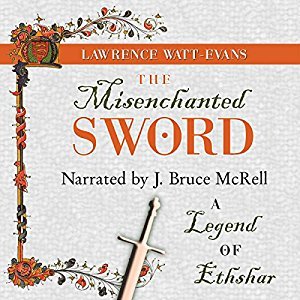
A Legend of Ethshar
The Misenchanted Sword was the first novel in the Ethshar series, and remains the most popular. It's the story of a young man who finds himself the owner of a sword with a complicated spell on it -- one that's sometimes beneficial, sometimes not -- and his attempts to lead a decent, normal life.

| Cover gallery |
|---|
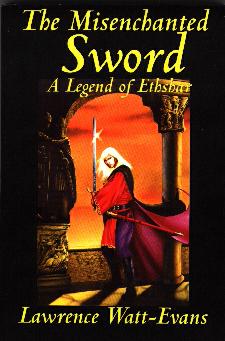 |
| The Wildside edition Cover art by Dalmazio Frau
|
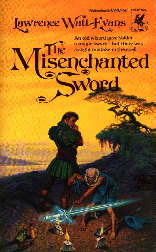
|
| The Del Rey edition Art by Darrell K. Sweet
|
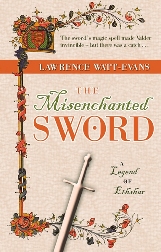
|
| The Cosmos edition Cover design by Stephen H. Segal
|
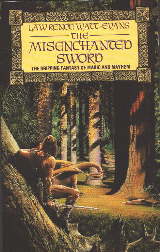
|
| The British edition Art by Geoff Taylor
|
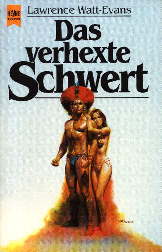
|
| The German edition Art by Boris Vallejo
|
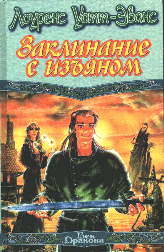
|
| The Russian edition Art by Anatoliy Dubovik (This is an omnibus of The Misenchanted Sword and With A Single Spell, and the cover title is for the former.) |
The Misenchanted Sword
A Legend of Ethshar
by Lawrence Watt-Evans
Part One: Wirikidor
Chapter One
 he marsh stank, with a sharp, briny stench that seemed to fill Valder's head. He stared out across the maze of tall grass and shallow water for a long moment and then reluctantly marched onward, into it. The ground gave beneath him; his boot sank past the ankle in gray-brown muck. He hissed an obscenity, then smiled weakly at his own annoyance and slogged forward.
he marsh stank, with a sharp, briny stench that seemed to fill Valder's head. He stared out across the maze of tall grass and shallow water for a long moment and then reluctantly marched onward, into it. The ground gave beneath him; his boot sank past the ankle in gray-brown muck. He hissed an obscenity, then smiled weakly at his own annoyance and slogged forward.
The enemy, he knew, was no more than an hour behind him. The marsh was nothing but a minor inconvenience by comparison.
To his left lay the open sea, and to his right was endless empty forest that was probably full of northern patrols and sentinels, human or otherwise. Behind him somewhere were the three northerners who had been pursuing him for the past four days. Ahead of him, wet and green and stinking, lay the coastal marshes.
He could, he supposed, have turned to the right and avoided the marshes, tried to lose his pursuers in the forest, but he had been running through forests for four days without being able to shake them off his trail. At least the marshes would be different.
After half a dozen long slow steps through the mud he struck a patch of solid ground and hauled himself up onto it; dirty seawater poured from his boots, which had not been water-tight in more than a sixnight. The marsh-grass rustled loudly as he pushed his way across the little hummock; he froze, peered back over his shoulder, and, seeing nothing but the unbroken line of pine trees, sank to the ground for a moment's rest.
The marsh was probably a mistake, he told himself as the foul smell saturated his nostrils. He could not move through it without making noise, it seemed--the rustling grass was far more audible than the crunch of pine needles, and the suck of mud wasn`t much better--and the enemy sorcerer almost certainly had some sort of spell or talisman that augmented his hearing. Even the other two northerners might have hearing more than normally acute; from what he had seen of their movements, Valder was quite certain that at least one of them was shatra--half man, half demon, though human in appearance. That eerily smooth, flowing motion was unmistakable.
All three might be shatra; the demon warriors could disguise their movements if they chose. One of his pursuers was a sorcerer, but he had heard it said around the barracks that some sorcerers were shatra. It seemed grossly unfair for a single enemy soldier to have both advantages, but life, he knew, was sometimes very unfair.
Nobody knew exactly what shatra were capable of, but it was generally assumed that they possessed magically-acute senses--though not, probably, up to the level a good sorcerer could achieve. Valder had to assume that the northerners chasing him could see and hear and smell far better than he could.
He had managed to stay ahead of the enemy patrol for four days now, but it had been due to luck as much as to anything else. He had exhausted his last few prepared spells in diverting the pursuit, but none of the diversions had lasted very long, and his company's wizard had not provided him with anything useful for actual combat. Valder was supposed to be a scout, after all; his job, if he encountered the enemy, had been to run back to base camp to warn his superiors, not to fight. He was not interested in a glorious death in combat. He was just another of Ethshar's three million conscript soldiers trying to survive, and for an ordinary human against shatra, that meant flight.
He had been able to travel at night as he fled because the greater moon had been almost full when the chase began, but the wizard-sight he had been given when he first went out on his routine solo patrol had worn off sixnights ago.
Thick morning fogs had helped him, as much as the moon had; he was running blind to begin with, with no intended destination, and therefore was not concerned about losing his way in the mist, so long as he didn't walk off a cliff. His pursuers, however, had had to grope carefully along his trail, using their sorcerous tracking a few steps at a time. They did not seem to have any unnatural means of penetrating the fog, either sorcerous or demonic.
And of course, the enemy had stopped for meals every so often, or for water, while he had had no need of food or drink. That was the only bit of wizardry he still had going for him, the only spell remaining, and if that were to wear off he knew he would be doomed. His outfit's wizard had known his job, though, and Valder had so far felt not the slightest twinge of hunger or thirst. He felt the charmed bloodstone in his belt-pouch, making certain it was still secure.
Now, though, he had come to this stinking salt marsh, and he wondered if his luck had run out. He settled himself on the grassy hummock and pulled his boots off, letting the foul water run out.
His luck had really run out two months ago, he decided, when the enemy had launched a surprise offensive out of nowhere and cut through to the sea, driving the Ethsharitic forces back down the coast, away from the forests and into the open plain. It had been phenomenally bad luck for Valder to have been out on solo patrol, checking the woods for signs of the enemy, when the assault came.
He had been looking for saboteurs and guerrillas, not the whole northern army.
Valder still did not understand how the enemy had cut through so quickly; all he knew was that when he headed back toward camp he had found northerners marching back and forth across the smouldering ruins of his home base, between himself and the Ethsharitic lines. He had encountered no scouts, no advance units, had had no warning. The fact that he had been sent out alone, in itself, indicated that his superiors hadn't thought the enemy had any significant forces within a dozen leagues, at the very least.
With the enemy to the south, the sea to the west, and nothing to the east but forest wilderness clear to the borders of the Northern Empire itself, he had headed north. He had hoped to get well away from the enemy, then find or build himself a boat and work his way south along the coast until he reached the Ethsharitic lines--surely the enemy could not have driven very far to the south, certainly not as far as General Gor's fortress. He knew nothing about boats, but he was reasonably sure that the enemy knew no more than he did. The Northern Empire was an inland nation; he doubted that there was any northern navy to worry about.
Unfortunately, the enemy had followed him northward along the shoreline, not because they knew he was there, but, as best he could guess, because they were afraid of Ethsharitic landings. He had kept moving north, staying ahead of the enemy scouts; four times he had settled in one spot long enough to start work on a raft, but each time a northern patrol had come along and driven him away long before he had a seaworthy craft.
Finally, four days ago, he had been careless, and a northerner who moved with the inhumanly smooth grace and speed of a shatra had spotted him. He had been running ever since, snatching naps when he could and using every ruse he could think of, and every spell in his pouch.
He pulled off his right sock and wrung it out, then draped it on the grass to dry; he knew that it would just get wet again when he moved on, as he would have to do quickly, but while he rested he wanted it dry. He was tugging at his left sock when he heard the rustle of grass. He froze.
The sound came again, from somewhere behind him, to the north--he had seated himself facing back the way he had come so as to have a better chance of spotting his pursuers.
It didn't seem likely that even shatra could have circled around behind him already. Perhaps, he told himself, it was just a bird or an animal of some sort. Carefully, with his right foot bare and his left sock hanging halfway off, he rose, trying not to rustle, and peered through the waving stalks.
Something tall was moving about, something dark gray and pointed at the top. Not shatra, or at least not the sort he was familiar with; they customarily wore round close-fitting helmets that covered almost the entire head. Enemy sorcerers usually wore similar black helmets festooned with talismans, and the common soldiers made do with whatever they could scrounge up--most often, ancient, rusty relics passed down through generations of warfare. This gray object did not look like any of those. It didn't look like a helmet at all; it looked like a cloth hat.
He wondered whether it might be some unfamiliar variety of beast, perhaps a magically-created one or some odd kind of small dragon. He had seen pointed hats; they had once, he understood, been the standard issue for wizards until someone pointed out that they made excellent targets, but he could not imagine what one would be doing here, far to the north and west of anything resembling civilization. Who would be wearing such a thing in a marsh on the edge of nowhere?
He sank back to the ground and pulled his left sock back up, ignoring the fact that it was still soaking wet, and then pulled on his other sock and both boots.
The rustling noise continued; whatever the tall thing with the gray point was, it didn't seem to have noticed him. He stood up again, then crouched and began inching his way toward whatever it was, parting the grass carefully with his hands.
As careful as he was, however, his movement was not silent. He stopped again and listened.
The other had also stopped. For a tense moment, Valder waited. Then the rustling began again, and the other moved away. Valder followed, trying to move only when the other moved, but the rustling of his own passage drowned out the other's noise and made it very difficult to judge when the other had stopped.
A few feet from the spot where he had sat and dumped out his boots Valder found himself at the northern edge of the dry hummock, facing a wide, shallow channel. He eased his foot into it until the sole of his boot was resting on solid bottom, sunk an inch or two into muck. His other foot followed, until he was standing in six inches of foul-smelling water and three inches of goo. Both feet were once again thoroughly soaked.
He waded across the channel, moving slowly so as not to splash. No grass grew in the center of the channel, and the reeds were not thick, so that he was able to proceed without making very much noise. He heard new sounds ahead, not rustlings, but clatterings, as if things were being casually moved about.
He reached the far side of the channel and slogged up the bank, pushing aside reeds and grass; he paused at the top to peer ahead.
The gray point was not in sight, but something else was, something yellow-brown, warm and inviting in the setting sun. It looked very much like a thatched roof. From his previous viewpoint it had blended with the surrounding foliage.
He was so intrigued by this evidence of a human habitation where he had expected none that he forgot his pursuers for the moment and made his way toward the roof without first checking behind. He knew that the inhabitant was just as likely to be a northerner as an Ethsharite, but if the gray thing had indeed been a hat, then whoever it was was probably not a soldier. Valder was armed and reasonably capable. He had the sword on his hip and a dagger on his belt; a sling was tucked away. He wore a breastplate of good steel. His helmet had been lost two days earlier, and he had abandoned his bow when he had run out of reusable arrows, but he still felt confident that he could handle any civilian, whether northerner, Ethsharite, or unknown.
One reason for his intense interest in the roof was that its mysterious owner might well have a boat, since he or she lived here in a coastal marsh--and that might save Valder the trouble of building a raft, as well as being safer and more comfortable.
He crept forward through the tall grass, across another dry patch, then through a reed-clogged expanse of water and mud and over another hummock, and found himself looking at a tidy little hut. The walls were plastered over with yellowish baked mud or clay; wooden shutters covered the two small windows on the near side. The roof, as he had thought, was thatch. A doorway faced the ocean, with a heavy drape hooked back to leave it mostly open. Seated in the doorway opening was the hut's inhabitant, an old man in a gray robe, his tall pointed hat perched on one knee. He was leaning back against the frame, staring out over the sea at the setting sun. The hut was built on the highest bit of land in the marsh, but faced down a short, steep, bare slope, giving a fine view of rolling waves and crying gulls.
Valder saw no weapons, but that didn't mean the old man had none; he had no way of knowing what might be inside the hut. The hat and robe did seem to resemble an archaic wizard's costume, and wizards of any sort could be dangerous.
He saw nothing to indicate the man's nationality, unless he counted the fact that the Northern Empire had very few wizards, archaic or otherwise--but then, the garb could easily be that of some obscure variety of sorcerer or other northern magician. He debated with himself what action he should take. He was not about to turn and leave, with the patrol still somewhere behind him. He could approach by stealth, try to take the old man by surprise, but that would appear definitely hostile and might cost him an ally, and with the rustling grass stealth might not be possible. Far better, he decided, to make his presence known and then see how the hut-dweller reacted.
With that resolve, he stood up straight, waved a hand in the air, and called, "Hello, there!"
The old man started violently, grabbed at his rope belt, and looked about wildly.
"Hello! Over here!" Valder called.
Spotting him at last, the man got to his feet and stared at Valder in open astonishment. "Who in Hell are you?" he demanded.
He spoke in Ethsharitic; Valder relaxed somewhat and looked the old man over.
He was short and scrawny, with unkempt white hair hacked off raggedly at shoulder-length, and a messy, unkempt beard. The gray robe he wore was clean but badly worn, with faded patches at each elbow and faint stains here and there. The pointed gray hat had fallen unnoticed to the ground when its owner arose. A rope belt encircled his waist and carried a large leather pouch on one side, a sheathed dagger on the other, where it had been hidden from Valder before; the old man's right hand rested on the hilt of the knife. His feet were bare, his eyes wide and mouth open with surprise.
He did not look dangerous, despite the dagger; for one thing, the weapon was still sheathed, where an experienced fighter would have drawn it automatically. Valder guessed the man to be a hermit, someone who hadn't seen another human being in years. His amazement at Valder's presence was very evident.
"I'm lost, and alone," Valder replied.
The old man stared at him for a moment, then called, "Didn't ask that." He sounded peevish; his surprise was fading into irritation at Valder's intrusion.
"I'm a soldier; I got separated from my unit. You don't expect me to give my name, do you? For all I know you're an enemy magician; if I tell you my name you might have power over me."
The old man squinted, nodded an acknowledgement of the truth of Valder's words, and then motioned with his left hand for Valder to approach. His right hand remained on the hilt of his knife. "Come here, soldier," he said.
With his own right hand on the hilt of his sword, Valder made his way through a few feet of grass and several yards of mud and reeds, and eventually splashed up out of the marsh onto the little island of dry ground surrounding the hut. He stood waiting while the old man looked him over carefully. As he waited he remembered the three northerners somewhere behind him, and suppressed an urge to tell the old man to hurry up; there was no need to frighten him yet.
"Ethsharitic, hah?" the old man said at last.
"Yes. Scout first class, with the Western Command under General Gor."
"What are you doing out here, then? Nothing to scout around here." Before Valder could reply, he added with sudden harshness, "Isn't any fighting around here, is there?"
"I got cut off from my unit, a long way south of here, and got chased north. The fighting is still a long way off. I thought maybe you could help me--loan me a boat or something."
"Maybe I can. No boat, but come in and tell me about it and we'll see." He gestured, and led the way into the hut.
Valder smiled. The old man's face was as easy to read as a baby's. He had obviously forgotten how to control or conceal his emotions, after being alone for so long; Valder had plainly seen his initial surprise and confusion turn first to annoyance at this unexpected disruption of his routine, and then to eager curiosity. Valder could not be sure, but he guessed the old man was also eager for a little human companionship. Even a hermit might get lonely eventually.
He followed the old man into the hut, ducking his head to clear the low doorframe.
Click here to return to the top of the page 

Origins
Back in 1983 I had finished the "Lords of Dus" series and was looking for something new to write. I'd already written a couple of science fiction novels (The Cyborg and the Sorcerers and The Chromosomal Code), but I wanted a new fantasy project.
Specifically, I wanted something lighter in tone than the rather gloomy and ponderous Dus stuff. I was (and am) a great admirer of L. Sprague de Camp's fantasy stories, such as the Harold Shea series he wrote with Fletcher Pratt, and The Fallible Fiend, and "Two Yards of Dragon," and thought it'd be great if I could do something like that.
I also wanted to write a series that could be read in any order, so that readers wouldn't have to worry about following through every single book. I had Marion Zimmer Bradley's Darkover series in mind as a model.
And actually, the world of Ethshar already existed; I'd started working it out years before, with the idea of eventually setting stories or a game there.
So I came up with a proposal not for a single novel, but a series of rather light-hearted fantasies set in the world of Ethshar. Most were to be titled The Epic Adventures of X, where X was the protagonist's name. I put together a general description of the series background and what I wanted to do with it, then whipped up very short little proposals for individual novels -- The Epic Adventures of Sterren of Semma, The Epic Adventures of Arl Arl's Son, The Epic Adventures of Tobas of Telven, and so on. And I intended to write The Epic Adventures of Sterren of Semma first.
I'd included some that didn't have "Epic" titles yet, such as Wirikidor and Dragon's Blood; those weren't as thought out yet. The basic premise for Wirikidor, the imperfect spell on the magic sword, had come to me in a dream back in 1978; I still have the scribbled note I wrote when I woke up so I wouldn't forget it.
But Wirikidor was really just a prequel to set up The Epic Adventures of Arl Arl's Son, where Arl Arl's son was this kid who wound up with the magic sword a century or two down the road; the story of where the sword came from wasn't what I was interested in.
Anyway, I sent the whole batch off to my agent, who sent them to Lester del Rey, who with his infallible perversity wanted to see the series done, but insisted it should not start with The Epic Adventures of Sterren of Semma. He wanted Wirikidor first, instead.
So I wrote it. And I changed the ending I'd planned, because the original ending would have made the book a real downer, but the new ending killed the entire premise for The Epic Adventures of Arl Arl's Son. Which is why it's never been written and never will be.
But what the hell, The Misenchanted Sword has been my best-selling book to date, so I don't mind sacrificing the unwritten Arl for its sake.

Publishing History
- Copyright 1985 by Lawrence Watt Evans.
- First edition published September 1985 in mass-market paperback by Del Rey Books, ISBN 0-345-31822-6, with cover art by Darrell K. Sweet. The Del Rey edition went through at least ten printings.
- Second U.S. edition published December 2000 in trade paperback by Wildside Press, ISBN 1-58715-282-7, with cover art by Dalmazio Frau , an illustration originally intended to illustrate Tanith Lee's Cyrion. This edition includes a bonus short story, "The Bloodstone." Still in print.
- Third U.S. edition published January 2008 in mass market by Cosmos Books, ISBN 978-0-8439-5916-1, with cover design by Stephen H. Segal. Does not contain a bonus story.
- First e-book edition released February 2002 by Wildside Press and available through all the usual outlets. The e-book has the same cover as the second edition, but does not include the bonus short story.
- Hardcover edition published October 2013 by Wildside Press, ISBN 978-1434442406
Foreign editions:
- The British edition was first published in 1988 by Grafton Books, ISBN 0-586-20008-8, with cover art by Geoff Taylor. I'm unaware of any additional printings.
- The German edition was first published in 1989 by Wilhelm Heyne Verlag GmbH & Co. KG, ISBN 3-453-03166-0, under the title Das verhexte Schwert, with recycled cover art by Boris Vallejo. Translation was by Wolfgang Jeschke, and so far as I can tell with my limited German it's pretty good. There's a really bizarre ad for soup on pages 191-192, using my characters without my permission.
- The Russian edition is an omnibus with With A Single Spell and was first published in 1996 by AST (Moscow) and Terra Fantastica (St. Petersburg) under the title Zaklinanie S Iz'yanom as part of their "Vek Drakona" series, ISBN 5-88196-971-5. Cover art is by Anatoly Dubovik (thanks to Nikolay S. Simkin for providing this information). The translator was G.B. Kosova.




